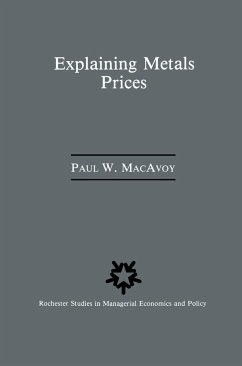Work on this book began in the Spring of 1983, not long after an Amax Corporation annual budget meeting. As a member of the Amax board of directors since 1979, I had been present at such meetings in which the molybdenum price had been forecast to move higher than $7.00 per pound. The actual annual average prices were $9.70 in 1980, $8.50 in 1981, and $4.00 in 1982. The forecast for 1983 called for prices to return to higher levels, but as both dealer and producer prices declined further, my research began in earnest. Initially, the research was to address the question of why the molybdenum price had declined by more than half in a short period. More fundamental, as other metals prices also declined, was an impelling need to know the causes of the abrupt and sustained reduction in metals price levels that year. As prices stayed at low levels, while those of other materials recovered over the 1983-1986 period, the question became that of why metals prices had remained at startlingly low levels for over five years.
Bitte wählen Sie Ihr Anliegen aus.
Rechnungen
Retourenschein anfordern
Bestellstatus
Storno









